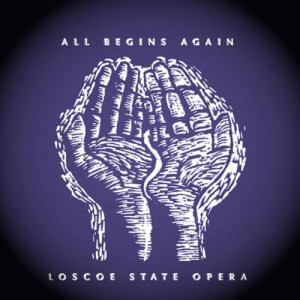 Loscoe State Opera’s All Begins Again (Anew Day, 2004)
Loscoe State Opera’s All Begins Again (Anew Day, 2004)
Sligo Rags’ The Night Before The Morning After (Celtic Music, 2005)
Pipeline’s Pipeline (R2/Rel, 2003)
Grada’s Endeavour (Compass, 2004)
Smithfield Fair’s Swept Away (Stevenson Productions, 2005)
Celtic Offspring’s Miss Gnomer (Celtic Offspring, 2001)
Genticorum’s Le Galarneu (Genticorum, 2002)
This omnibus review features bands from the UK, Ireland, Canada and the USA whose basic approach would be to buck the obvious ideologies associated with Celtic music. Some have mixed lineups nationality wise, and others just like taking chances with the music and adding their own personal flavours to the brew. The fact that the bulk of the material on 90% of the seven CDs under review contains mostly all original material says enough for the personalised viewpoint expressed on things Celtic.
Loscoe State Opera is a UK based folk rock band signed to AnewDay records run by David Rees and named after the Jethro Tull fanzine of the same name. When considering the band’s musical style the Tull connection is obvious as is the inclination towards a rootsy fusion of traditional styles with rock pretensions. All Begins Again is firmly in the British folk rock mould as in the Oyster Band/Steeleye Span (circa Storm Force Ten)/ Fairport vein with a strong Celtic undercurrent, more like Horslips with a dash of progressive rock and some Tull touches alongside the social conscience of The Levellers. Rather than remain fenced in one vein, Loscoe State Opera crosses the prog/folk rock/Celtic rock/punk folk divide at once. There’s some good original material here from Dave Everitt, including the compulsive opener ‘Midsummer’s Day’ while the generation-gap saga ‘Pretty Story’ shows promise. Musically the sound is rich and powerful with plentiful fiddle, accordion and flute out front backed by a solid rock rhythm section. Drums, bass and electric guitars are solidly anchored in the folk-rock groove making Loscoe State Opera like the kind of band that’s found playing in The Brasenose during Cropredy Festival as other bands signed to AnewDay have done in the past. On traditional material Ben Dalgleish’s anguished vocals shine out although he races through Martin Carthy’s setting of ‘Arthur McBride’ as if going for a finish line, while a 10-minute arrangement of ‘Geordie’ goes the gamut from doleful to celebratory complete with Poguesy energy and extended instrumental blasts of 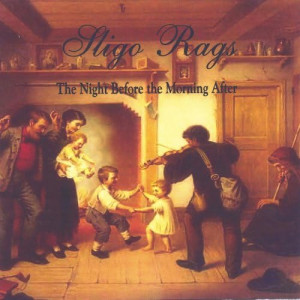 traditional tunes. Some lovely, fluent lighter touches in the fiddle and box department aligned to a clean sprightly production that captures their energetic approach works in their favour. Whether Loscoe State Opera still exists or not, they can rest assured that in All Begins Again they have made an album that is cleverly assured and musically accomplished and worth seeking out.
traditional tunes. Some lovely, fluent lighter touches in the fiddle and box department aligned to a clean sprightly production that captures their energetic approach works in their favour. Whether Loscoe State Opera still exists or not, they can rest assured that in All Begins Again they have made an album that is cleverly assured and musically accomplished and worth seeking out.
Sligo Rags, named after the 5 million bags of them mentioned in ‘The Irish Rover’ is a US west coast trio, comprised of Michael Kelly on fiddle, David Burns on guitar, banjo and mandolin, and bassist Gordon Rustvold. On The Night Before The Morning After they play a set of familiar Irish ballads with an American old time feel. This is what puts them stylistically somewhere between the ballad boom of Dublin’s O’Donoghue’s Pub in Merrion Row and the Appalachian Mountains, although the band is based in California. They are more traditionally American in sound than Clancy Brothers-style Irish American outfits, which makes their take on Irish ballads sound sincere and provides a genuine effort to unite the folk traditions of Ireland and the USA. While the menu has ballad bar-band standards like ‘Clare to Here’, Ewan McColl’s ‘Dirty Old Town’ and ‘Ordinary Man’, the subtle instrumental touches are more newgrass and old time than standard Irish folk ballad backings. They also sound assured and confident working in this musical area and the performances yield a quiet sense of achievement. This is a good crop of Sligo Rags and I hope there will be more in the future — very impressive.
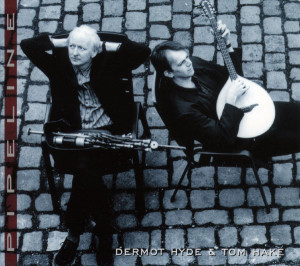 Pipeline is an Irish German collaboration made up of singer, piper and whistler Dermot Hyde from County Donegal and Tom Hake who plays bouzouki, guitar and harp. This multi-instrumental twosome composes much of their own material divided into songs and tunes with traditional stock comprising the remainder of the repertoire. With their multi-faceted instrumental combinations and a quick astuteness of ideas and creative energy, their approach recalls touches of Robin Williamson’s Merry Band mixed with an acoustic Moving Hearts.
Pipeline is an Irish German collaboration made up of singer, piper and whistler Dermot Hyde from County Donegal and Tom Hake who plays bouzouki, guitar and harp. This multi-instrumental twosome composes much of their own material divided into songs and tunes with traditional stock comprising the remainder of the repertoire. With their multi-faceted instrumental combinations and a quick astuteness of ideas and creative energy, their approach recalls touches of Robin Williamson’s Merry Band mixed with an acoustic Moving Hearts.
For a band with an approach this eclectic, their original material in the traditional vein doesn’t sound forced or awkward. A good example of this intuitive style is found in ‘Thirteen Years’, a cute reflection on a 13 year old boy’s decision to run away to the local hiring fair, coupled with a lilted reel, “Keelin’s Return”, both composed by Dermot Hyde. The sound is both familiar and new with a fresh twist. Another fine creation of a different hue is the ‘Adair’s March’ suite, a 9-minute evocation of the last major eviction in County Donegal; the piece captures the destitution through a narrative ballad, slow air and Pibroch-influenced march, with the total effect recalling Robin Williamson’s setting of Five Denials on Merlin’s Grave. A great final track, ‘Non te mamores, meniña’ is a Galician medley with special guest Uxia Sennelle sending her vocal chords soaring over the multi-hued background which sounds like a mini Chieftains-style arrangement. Pipeline played Milwaukee Irishfest in 2004 and signed to a Scottish record label R2/REL for distribution outside Germany. Celtic fans 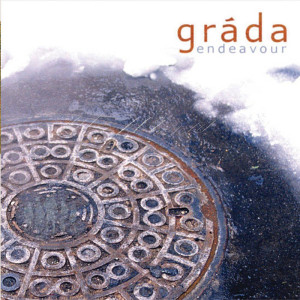 who haven’t accessed this exemplary recording should do so now. This ranks as one of the best Celtic/Neo Celtic crossover efforts I have heard. Pipeline is a remarkable effort that knocked me sideways when I first encountered it in 2003 and it still does the job.
who haven’t accessed this exemplary recording should do so now. This ranks as one of the best Celtic/Neo Celtic crossover efforts I have heard. Pipeline is a remarkable effort that knocked me sideways when I first encountered it in 2003 and it still does the job.
Gráda is an Irish/New Zealand outfit based in Dublin that has made a considerable impression in America on their most recent tours there. One of the more progressive Irish Neo Celtic bands, they specialise in composing original tunes or sourcing rarely heard material and giving it their own stamp rather than retracing the traditional output. Endeavour, their first CD issued at home in 2002, was given US release through Compass. Their second album The Landing Stage has since been issued and a third is in the can. Gráda’s next album will feature Galway born Nicola Joyce replacing Anne Marie O’Malley in the vocal seat. Anne Marie was featured on Endeavour singing and playing bodhrán joined by Kilkenny born fiddler Brendan O’Sullivan, Dublin flautist Alan Doherty and the guitar and bass pairing of Gerry Paul and Andrew Laking from New Zealand.
Musically Gráda is similar to Lunasa in flute/fiddle/bass/guitar lineup, but plays original tunes instead of traditional material and strong jazz underlay pervaded. Sets like ‘Pint of Reference’ and ‘Snow Leopard’ shows their trad/jazz inflections while ‘Biodegradable’ offers a languid take on Irish/Breton forms. An exceptional solo spot from Alan Doherty on ‘Anto’s Gambit’ show a command of mood and tune pace. A rousing cover of Kila’s ‘Cathain’ is a good foot stomping opener and the Australian song ‘Dimantina Drover’ impresses with a nicely restrained vocal from Anne Marie O’Malley. The best song is an original, the closing, title track ‘Endeavour’, a true story of New Zealand history — a genre that Andrew 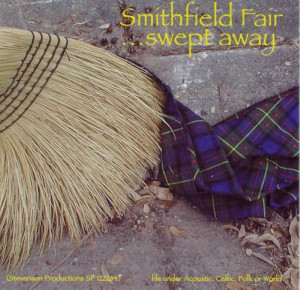 Laking excels in. Endeavour is a very good debut album in attempting to blend all the diverse strands but the ensemble’s best work is yet to come I reckon.
Laking excels in. Endeavour is a very good debut album in attempting to blend all the diverse strands but the ensemble’s best work is yet to come I reckon.
Smithfield Fair offer something different within this omnibus as they concentrate on the vocal aspect of their repertoire as opposed to mixing vocal and instrumental material. However, they do write their own songs and in doing so blend and merge various aspects of their American and Scottish backgrounds. I have commented favourably on this group at an earlier stage and their most recent release Swept Away now comes under scrutiny. The Louisiana based trio of Jan Smith, Dudley-Brian Smith and Frank Bladen have issued nine recordings to date. Swept Away begins with two standards a rousing up-tempo version of Paul McCartney’s ‘Mull of Kintyre’ and Frank McPeake’s classic ‘Wild Mountain Thyme’. However, self-penned material features the Parisian-flavoured title track ‘Swept Away’ — subtitled ‘A Lover’s Waltz’, and ‘A Fine Homecoming Day’, the latter expressing the wish to return home to Scotland, and ‘Greyfriar’s Bobby’ celebrating the famous Skye terrier and companion of Edinburgh policeman John Gray, whose dedication to his master went beyond death. The evocations are pleasing within the folk ballad genre with robust choruses and retrained arrangements. Swept Away is more for the listener and song learner than 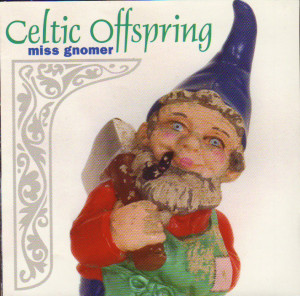 session freak and fusionist. However, it does have its own place in this omnibus as it dares to buck things even if just slightly.
session freak and fusionist. However, it does have its own place in this omnibus as it dares to buck things even if just slightly.
Celtic Offspring is a Canadian outfit whose Miss Gnomer features the tackiest leprechaun ever to grace a CD cover. Thankfully that’s the most tasteless part of the project as the rest is highly ingenious and promising. The band is a quartet based in Ontario playing Irish and Scots instrumental tunes and their own vocal and tune material. They are quick on pace changes within a set from reel to jig and back again as in ‘Hag at the Churn’, displaying an ability to reroute before returning to main theme something akin to The Tannahill Weavers. However, this Canadian outfit’s musical strains are less obviously boisterous and subtler with clever balance of pipes, fiddle and stringed instruments. There is a good proportion of original songs with five songs written by Ed Nicol with strong vocal harmonies and sounding not unlike Spirit of the West. This is a promising debut album and hopefully Celtic Offspring will deliver the goods next time again as Miss Gnomer is an impressive opening hand.
[Editor’s note: Methinks John mistook the ugly gnome on the cover for an ugly leprechaun — understandable as he’s Irish himself, but the pun in the title ought to have been a tip-off!]
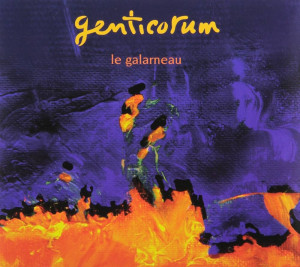 Genticorum is an interesting Canadian trio with flute out front adding a strong Irish feel to music. Playing predominantly within the local tradition, they venture outside to include Breton and Irish influences. Genticorm is a trio that ends up playing festivals in places as far fling as World Music festivals in the Rainforests of Borneo. That said, the music is straight down the line Canadian with a Celtic sound and it radiates a sense of warmth and technical accomplishment. Pascal Gemme’s fiddle and feet lay down a beat that stays down while Yann Falquet’s guitar adds texture and Alexandre de Grosbois-Garand ‘s flute adds a sweet breathy timbre. Le Galarneu their first album, from 2002, is a collection that features predominately traditional and local material from Canada and Brittany — the latter more mellow than La Bottine Souriant and reminding more of the lesser-known French Legende, or Le Vent Du Nord. Genticiorum is another fine new Canadian outfit, and Le Galarneu sees them taking their Quebecois home tradition and doing something a little different — not radical but just a fresh new sheen on old paint. It is sweet and savoury at once; recommended.
Genticorum is an interesting Canadian trio with flute out front adding a strong Irish feel to music. Playing predominantly within the local tradition, they venture outside to include Breton and Irish influences. Genticorm is a trio that ends up playing festivals in places as far fling as World Music festivals in the Rainforests of Borneo. That said, the music is straight down the line Canadian with a Celtic sound and it radiates a sense of warmth and technical accomplishment. Pascal Gemme’s fiddle and feet lay down a beat that stays down while Yann Falquet’s guitar adds texture and Alexandre de Grosbois-Garand ‘s flute adds a sweet breathy timbre. Le Galarneu their first album, from 2002, is a collection that features predominately traditional and local material from Canada and Brittany — the latter more mellow than La Bottine Souriant and reminding more of the lesser-known French Legende, or Le Vent Du Nord. Genticiorum is another fine new Canadian outfit, and Le Galarneu sees them taking their Quebecois home tradition and doing something a little different — not radical but just a fresh new sheen on old paint. It is sweet and savoury at once; recommended.
These albums offer some intriguing glances at the world of Celtic music played within the band format. While traditional music and songs inform the styles the artists play, it does not dominate in ideology as other fresh ideas abound. The main thing that can be said about these releases is that they suggest a fresh vibrant and different look at Celtic and Folk music. Vive la difference!
